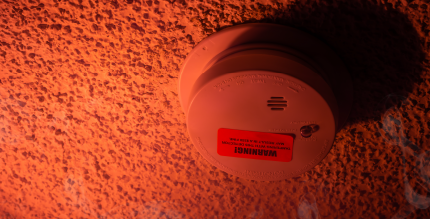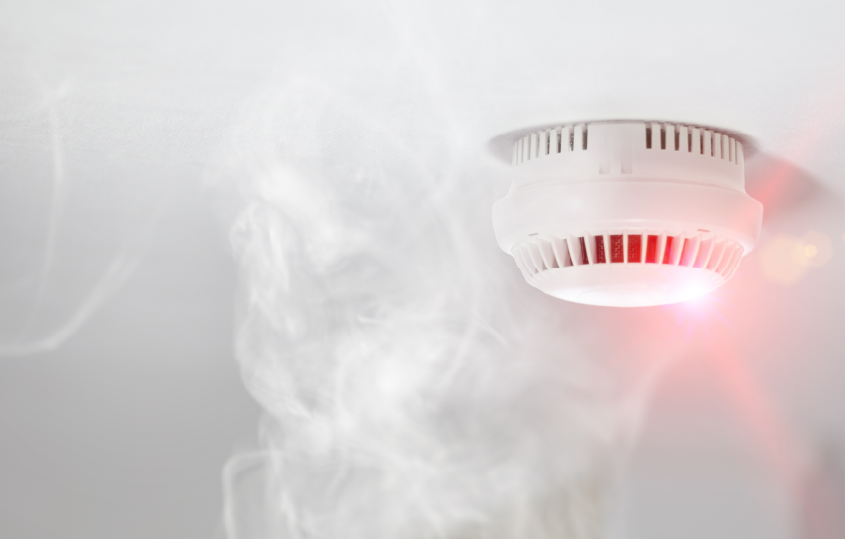Fire alarm and smoke alarm systems are valuable equipment to protect your property, and most importantly, many people often ask, “Are fire alarms and smoke alarms the same?”
This is a common question for those determining the best protective measures for their home or business. While both alarm systems function to alert occupants to danger, these terms are not interchangeable and have distinct differences!
Thankfully, our team clarified the difference between fire and smoke alarms in the following article.

Smoke Alarms
Smoke alarms react to smoke and raise alerts for potential fire sources within the building. The sensors built into the smoke detectors recognize fumes, specifically carbon monoxide, based on their composition and concentration and trigger an audible alert system. Smoke alarms are usually present in homes and can only detect smoke.
There are two common types of smoke detectors that use different technology to sense smoke particles: ionization detectors and photoelectric detectors. Both types of smoke detectors bear different advantages as safety equipment.
The ionization-based detectors recognize small black soot faster than the latter type because black soot accumulates in a greater mass and can affect the electric current in the device. The system is activated as the electric current is reduced in response to the smoke’s presence. These detectors are typically responsive to flaming fires.
Photoelectric sensors, which use a light beam and a sensor to detect smoke, are considered more sensitive to large and light-colored particles, which are reflective and quickly impact the light sensors. These detectors respond best to smoldering, smoky fires.
In some advanced smoke detectors, dual sensors are installed to encompass both ionization and photoelectric detectors and provide the earliest warning of any type of fire. Dual sensor technologies are considered the best alert systems in the event of an emergency.
Smoke alarms are crucial to home safety measures because they recognize potential dangers, like flame and the presence of carbon monoxide, and quickly alert occupants to evacuate. The occurrence of a residential fire often takes place during the night when people are asleep. The smoke alarms with a blaring sound system and flashing lights are especially helpful in notifying sleeping homeowners and preventing accidental smoke inhalation and carbon monoxide poisoning. Fire victims are often overcome by smoke and poisonous gas, not burns, which is why it is imperative to install smoke detectors in all house rooms, including sleeping areas. Smoke alarms are an excellent fit for residential settings because they can be easily placed in many rooms throughout the household and receive power from a simple battery or a connected system.

Fire Alarms
Fire alarms are used as an alert of smoke, changes in high temperatures, or water movement; they can be considered a comprehensive safety system for a business. Fire alarms are often installed in large buildings and luxury homes because they can notify all occupants at risk, not only one part of the building. Fire alarms are activated manually by a pull-down station at the sight of danger or automatically with the help of sensory and smoke detectors. The automatic initiating devices, which include sprinkler water flow switches, heat detectors, and smoke detectors, work together to ensure the safety and evacuation of endangered occupants.
Fire alarms wield a wide range of capabilities in response to signs of fire. Smoke detectors are usually incorporated into a fire alarm system and aid in fire prevention, but they are not the only features.
One of the most helpful parts of a fire alarm is the fire alarm control panel, which automatically contacts emergency service agencies when the system is set off. When a fire alarm is activated in the presence of a fire, the central monitoring station receives a dispatch to the fire’s location, and emergency responders are sent immediately. As the emergency services are on their way, the sprinkler water flow switches serve as a first response to putting out the ignited fire. This system comprises a glycerin-filled glass bulb that shatters in high heat, activating the sprinkler head and notifying the fire alarm control panel. Emergency responders can even gauge the fire’s severity based on the sprinkler system‘s intensity. Since high heat levels activate the sprinkler system, firefighters are quickly informed that the alarm is a real emergency, not a false alarm.
The high temperature and presence of water will usually set off a horn alarm with strobing lights. The bright flashing lights of built-in fire alarms are used to catch occupants’ attention, incite a sense of urgency to evacuate, and ultimately alert individuals with hearing impairments. Some alarms are designed to be even louder than the surrounding noise of the building to ensure that establishments with loud machinery are alerted.
Fire alarms are ultimately designed to alert and evacuate many people in a building. They are legally required to be installed in public buildings, like schools, businesses, and hospitals, and protect a wider surface area with diverse capabilities beyond detecting smoke.
Keep Your Home Protected
As you can see, fire alarms and smoke alarms are not the same, but they are essential parts of a secure safety system and can reduce the risk of fire and rising gas levels. Fire alarms encompass various devices that accomplish more than just detecting smoke, which is the key difference between a smoke detector and a fire alarm. Fire alarms not only identify danger but initiate action, while a smoke detector can only recognize the presence of smoke. Those with fire alarms have a comprehensive system of protection compared to smoke detectors and can be an excellent option for those searching for extra protection and peace of mind.
Determining the best alarm system can still be challenging after learning the difference between fire alarms and smoke detectors. Each home or business calls for a unique protection system, and Mesa Alarm Systems is a great resource to answer your questions.
Mesa Alarm Systems offer free consultations! Our team of security alarm professionals would be happy to answer any questions about which alarm best fits your home or business and are ready to provide the finest safety equipment in Houston, tailor-made for you.
Safety is a priority. Contact Mesa Alarm Systems today for a consultation for your best protection.



